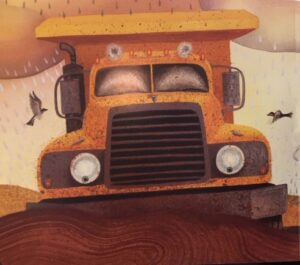 As posted on LinkedIn, December 10, 2019.
As posted on LinkedIn, December 10, 2019.
I have written a number of times in the past here on LinkedIn about “The Little Blue Truck,” analyzing the various strains of the deep meaning of this book which was written by my good friend, Alice Schertle.
On January 3, 2019 and on February 17, 2018, I wrote about “The Little Blue Truck” and the power of connection. On August 25, 2018, I described how “The Little Blue Truck” taught me about humility. On June 27, 2018, I wrote about how “The Little Blue Truck” changed my life.
I think it is because of the depth of “The Little Blue Truck” that adults actually enjoy reading it to small children. I know I do, or rather, I would, if I had any very young children to read it to. But being grandchildless, and in a town with mostly retired people and few children, I am resigned just to reading it to myself. Which I actually do quite often.
Today’s take on “The Little Blue Truck” has to do with vulnerability. And also, how the balance of roles change in life, during long periods, and even during short spans of time. I ardently believe that this is an intentional subtext in Alice Schertle’s book.
The book is set in a halcyon period in a rural environment of distant memory. Kind of like the town in which I now reside.
City and suburban people do not see the beauty of country living on a daily basis. The Blue Truck, as well as the other personages of “The Little Blue Truck” certainly do experience it. Life is simpler. Animals are simpler than humans. That’s why we like them so much. The country life makes them pure and good, like all the people in my own little rural town.
The villain of the book is a big, brutal, heavy-duty dump truck, who seems to be a little out-of-place in this bucolic country setting. He (yes, the truck seems to be gendered) is in a rush. He travels down the road realy fast. He is a dump truck on a mission. He doesn’t stop to smell the roses. He thinks he doesn’t need people… or… animals … or … lovely helper trucks, like the little blue one that we all know and love.
The dump truck seems all-powerful and independent in the beginning of the book. The animals and the little blue truck seem quite vulnerable during the first part of the story. They are friendly to each other without reservation. Note that the Toad says “Croak!” and winked an eye when the Little Blue Truck went rolling by.
Other animals have similar utterances utilizing their own distinct animal languages. They don’t have defenses against each other. They are capable of deep and unreserved feeling. They are vulnerable, and express their vulnerability to each other. And that makes them very happy little animals, as is the little blue truck. Being vulnerable in that sense of the word is a good thing.
The dump truck rushes through the conclave of animals and past the little blue truck, not caring whether he hurts them or not. He shows himself to be a bully, and not vulnerable.
However, he gets hoisted on his own petard, and lands in the mud and can’t get out. He can no longer be a bully. Now he is helpless and exposed. He is at risk and in danger. He has become vulnerable in the blink of an eyelid. That’s life. It happens to all of us. We’re all powerful one minute, and then we’re in trouble! The dump truck learned that in a nanosecond.
As the book tells us, he (the dump truck) sounds scared. At the end of the book he was transformed. Vulnerability does indeed transform. So stay vulnerable, o yea businesspeople, in your business lives as much as possible. Things will go better, and you’ll be happier! Make your business life a consecrated stage to act out good behavior. Be vulnerable in your dealings with people when doing business. Good things will abound to you.
I don’t know whether I’ve now mined all the deep meaning from “The Little Blue Truck.” Only time will tell. However, don’t be surprised if some day you’ll see another “Little Blue Truck” post from me. And thank you, Alice Schertle, for writing this wonderful and meaningful book.
© 2019 Laurie Israel
